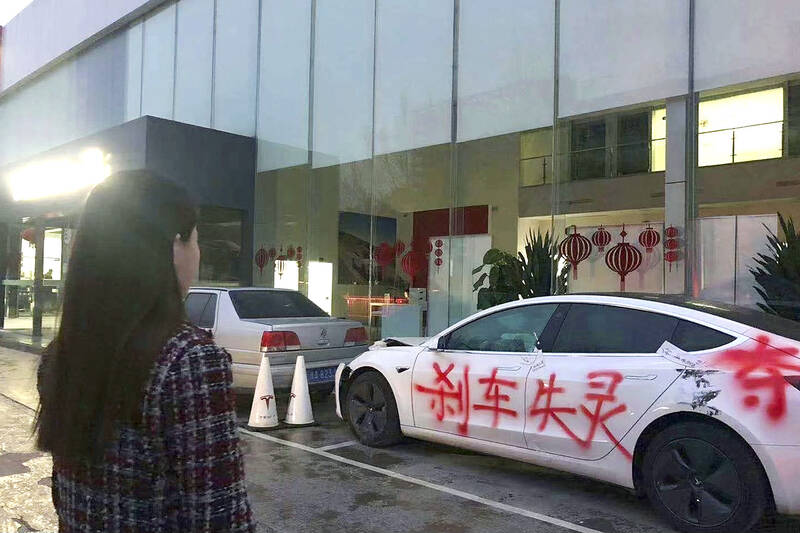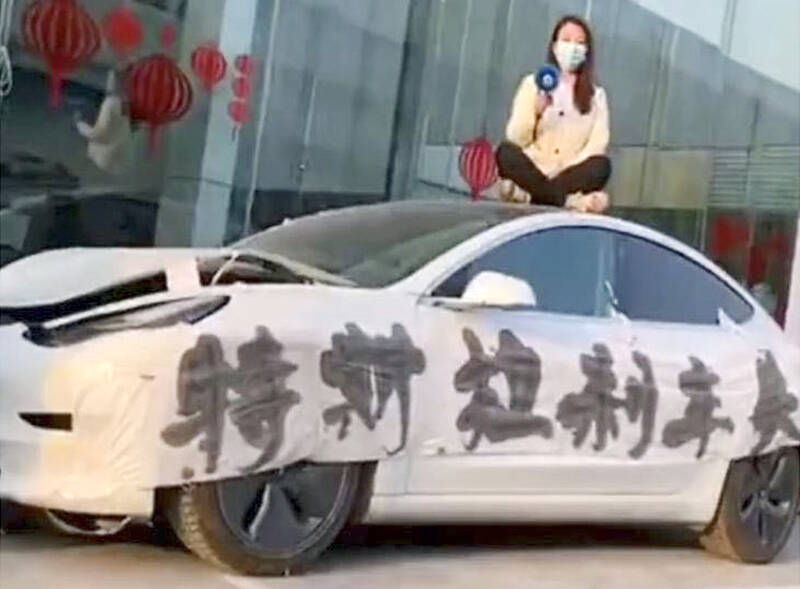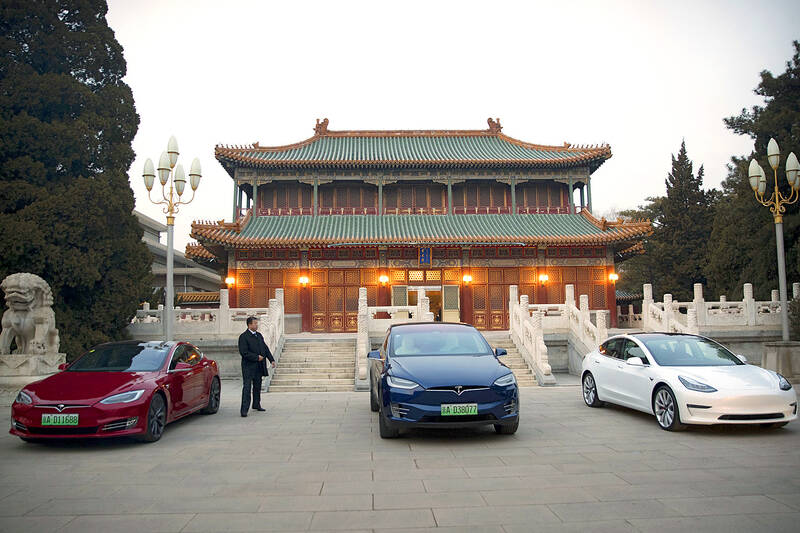Zhang Yazhou was sitting in the passenger seat of her Tesla Model 3 when she said she heard her father’s panicked voice: The brakes do not work. Approaching a red light, her father swerved around two cars before plowing into a sport utility vehicle and a sedan, and crashing into a large concrete barrier.
Stunned, Zhang gazed at the deflating airbag in front of her. She could never have imagined what was to come: Tesla Inc sued her for defamation for complaining publicly about the vehicles brakes — and won. A Chinese court ordered Zhang to pay more than US$23,000 in damages and publicly apologize to the US$1.1 trillion company.
Zhang is not the only one to find herself in the crosshairs of Tesla, which is led by Elon Musk, among the richest men in the world and a self-described “free speech absolutist.” Over the past four years, Tesla has sued at least six car owners in China who had sudden vehicle malfunctions, quality complaints or accidents they claimed were caused by mechanical failures.

Photo courtesy Zhang Yazhou via AP
The company has also sued at least six bloggers and two Chinese media outlets that wrote critically about the company, according to a review of public court documents and Chinese media reports. Tesla won all 11 cases for which the Associated Press could determine the verdicts. Two judgements, including Zhang’s, are on appeal. One case was settled out of court.
It is not common practice for automakers — in China or elsewhere — to sue their customers, but Tesla has pioneered an aggressive legal strategy and leveraged the patronage of powerful leaders in the Chinese Communist Party (CCP) to silence critics, reap financial rewards and limit its accountability.
Tesla’s record in China shows how Musk has thrived in a system in which regulators, the media and the courts — which must all ultimately answer to the CCP — are, by design, somewhat intertwined.

Photo courtesy of Zhang Yazhou via AP
Tesla has profited from the largesse of the Chinese state, winning unprecedented regulatory benefits, below-market rate loans and large tax breaks. With a few pointed exceptions, Tesla has enjoyed ingratiating coverage in Chinese media, and journalists said they have been instructed to avoid negative coverage of the automaker.
Tesla’s windfall has extended to the courts — and not just in legal actions Tesla has brought against customers. A review of public court documents found that Tesla won nearly 90 percent of civil cases over safety, quality or contract disputes brought by customers.
“The government gave Tesla a super status that put consumers in a very vulnerable position,” said Qiao Yudong (喬宇東), a former lawyer for US sports car company Saleen Automotive Inc in China. “That’s why some consumers had to resort to extreme actions.”

Photo: AP
One of those desperate customers was Zhang.
The February 2021 crash in Henan Province sent Zhang’s mother and father, who had a concussion, to the hospital for four days, medical records showed. Zhang — who was unharmed in the accident, as was her baby niece — wanted to understand what had happened: How could her dream car have turned into such a nightmare?
Traffic police determined that the crash was her dad’s fault because he had not maintained a safe following distance. Zhang insisted that the brakes had malfunctioned, sending the vehicle out of control. She filed a complaint with a local market regulator, requesting a refund and compensation.
Teslas are among the most computerized vehicles on the market, so Zhang asked the automaker to turn over the full pre-crash data from her car, hoping it might help explain what went wrong. Tesla refused.
“Tesla’s employees were very arrogant and tough in dealing with my complaints,” Zhang said in an interview. “I was burning with anger.”
After weeks of stewing, she draped her damaged car with a banner proclaiming “Tesla brake failure” in front of the Tesla dealership in the provincial capital, Zhengzhou, about 200km from her home. She sat on the Tesla’s roof and blared her protest through a bullhorn.
“Tesla Model 3 brakes failed,” she said. “A family of four almost died.”
The next month, she parked her damaged car outside an auto show in Zhengzhou. It was all to no avail — Tesla refused to turn over the full data and mediation went nowhere.
Figuring that top Tesla officials would attend an April auto show in Shanghai, she and a friend — who had also had a problem with her Tesla — donned matching T-shirts with the phrase “Brakes fail” and headed for Tesla’s booth, determined to buttonhole executives.
The automaker’s officials avoided them, and they could not get anyone to hear them out, Zhang said.
Her friend, who was six months pregnant, started shouting: “Tesla brakes fail.”
Zhang clambered on top of a shiny red display model and started hollering, too.
“Things escalated,” she said.
The moment — captured on cellphone videos shot by onlookers — went viral on Chinese social media. Burly security guards hauled Zhang out, and she was detained for five days.
Some observers speculated that Zhang’s protest had been orchestrated — perhaps by a competitor or by the Chinese government to pressure Tesla to conform with Chinese regulations. Tesla alleged that Zhang had not acted on her own. A top executive speculated to Chinese media that she “had someone behind her” and said Zhang was making a fuss because she just wanted higher compensation.
Zhang insisted she acted on her own — and out of anguish. Outraged, she sued Tesla for defamation, saying that the executive’s comments unjustly cast her as a troublemaker to deflect attention from the company’s own shortcomings.
Then she found herself on the receiving end of a lawsuit filed by Tesla.
Tesla said Zhang had deliberately spread false information that damaged the brand and asked for 5 million yuan (US$689,275) in damages.
The case, which a court took up in October 2021, came as Tesla faced a barrage of criticism in China.
Dozens of Tesla owners had been publicly complaining about alleged brake failures, battery fires, unintended acceleration and other defects, as well as what they claimed were misleading sales practices. The same month as Zhang’s crash, Chinese regulators summoned Tesla to respond to quality concerns raised by such reports.
Zhang’s emotional protest sparked a rare burst of criticism of Tesla in Chinese media. Under pressure from regulators, Tesla finally released the data from her car, which the company said showed her father had been driving nearly 120kph and that the brakes had functioned to reduce the magnitude of the collision.
Tesla had finally given Zhang what she had been asking for, but they had published the data publicly and included her vehicle identification number. She said she and her family started getting threatened and doxed online. She was also unsure if Tesla had modified or redacted the data from her car.
It was less than the victory she had hoped for. Feeling besieged, she sued Tesla a second time, in March 2022, for invading her privacy.
Zhang lost both cases.
Meanwhile, the defamation case against her was grinding along. Back in court as a defendant, Zhang was unable to prove that the brakes on her Tesla had failed. In a closed trial, a Shanghai court ruled in May last year that Zhang’s public complaints went beyond what magistrates considered reasonable, factual criticism and ordered her to publicly apologize and pay 170,000 yuan to cover damages and the legal costs of the world’s most valuable car company.
Zhang appealed the ruling.
She said that her lawsuit is a cry for transparency and accountability and that a company as rich and powerful as Tesla should be able to tolerate legitimate criticism from its customers.
“I refuse to accept it,” she said. “As a consumer, even if I said something wrong, I have the right to comment and criticize. I spoke about my feelings as a user of the car. It has nothing to do with damaging their reputation.”
Her odds of winning the appeal against Tesla do not look good. Tesla has not only won the defamation cases it brought against unhappy car owners and critical journalists, it has also prevailed in lawsuits customers have filed against it.
A review of a Chinese government database of court filings published online found 81 civil judgements in which car owners sued Tesla over safety and quality issues or contract disputes. Car owners won in only nine of those cases.
The Shanghai High People’s Court said in a statement that judgements are the result of a “fair trial” based on “the objective facts of the case.”
“It cannot be assumed that the party has received ‘special protection’ or ‘special treatment’ because of their victory,” the court wrote.
While some auto industry experts in China said it is generally difficult for customers to win cases against auto companies, others said it is remarkable for a foreign company to enjoy such success in Chinese courts.
“For Tesla to win that percentage of the time is an anomaly,” said Bill Russo, founder of Automobility Ltd, an advisory firm based in Shanghai, who also used to be regional head of Chrysler in northeast Asia. “The odds are stacked against you. It’s like going to the casino and winning every hand.”
Tesla’s commercial and political success in China has hinged on the support of a powerful patron: Chinese Premier Li Qiang (李強), the former party boss of Shanghai, and now second in rank only to Chinese President Xi Jinping (習近平). It was under his watch, in 2019, that Tesla built its first overseas factory on the outskirts of China’s financial capital.
With Li’s support, Tesla became the first foreign automaker allowed to retain complete control over its China venture and got low-interest loans and generous tax breaks. China also adopted an emissions credit scheme modeled after a US program that has generated billions in income for Tesla.
In January 2020, one year after breaking ground, Musk unveiled the first Chinese-made Teslas on a stage in Shanghai. Tesla turned an annual profit for the first time in its history that year, and Musk was declared the world’s richest person in January 2021.
China got what it wanted, too: Tesla was a potent catalyst for domestic production and consumption. Before Tesla’s arrival, new energy vehicles accounted for about 5 percent of China’s auto market. Today, more than half of passenger vehicles sold retail in China are powered by an electric motor, analysts said.
Chinese battery maker Contemporary Amperex Technology Co Ltd (寧德時代新), a key Tesla supplier, has embedded itself in global supply chains to become the world’s largest electric vehicle battery maker. China’s BYD Co (比亞迪) is now the world’s largest electric vehicle manufacturer and a growing competitive threat to legacy automakers in the West.
“Tesla had a large part to play in that,” said Tu Le (涂樂), the managing director of Sino Auto Insights, a consulting firm.
Tu said the way the government smoothed the way for Musk’s factory was critical.
“It was a swampy field on the outskirts of Shanghai. A year later they’re rolling cars off the line,” he said. “I don’t know if that happens anywhere else in the world.”
Requests for comment to the Chinese State Council, which Li runs, and oversees China’s government ministries, went unanswered.
Musk still swings by to meet Li when he goes to China. Their encounters underscore the complexity of Musk’s overlapping interests as a businessman and the most China-friendly member of US President Donald Trump’s inner circle.
Musk’s “greater objective was winning influence over the people that mattered for him, that enabled him to get things done,” Russo said. “He’s done a good job of it in China and he’s done it now with the influence he purchased with his relationship with Trump.”
In the US, Tesla also has been subject to a raft of customer safety complaints and lawsuits over autopilot function, battery charging, alleged suspension defects, sudden braking or acceleration, faulty airbags and allegedly monopolistic practices on repairs and parts. Judges have dismissed some cases. In others, Tesla settled out of court or paid hefty settlements.
Tesla has not publicly sued any of its US customers for speaking out, although last month, Musk wrote on X that “maybe it is time” to sue media outlets for coverage that could stain Tesla’s brand.
Tesla has already successfully done that in China.
Two Chinese journalists based in Shanghai said there is an unwritten rule to avoid critical coverage of Tesla. Both spoke on condition of anonymity, fearing retaliation.
“We were told by our editor that we should not write negatively about Tesla because it is a key company that was introduced and protected by the Shanghai government,” a technology reporter said.
Tesla stands out even among its cut-throat Chinese competitors — in going after car owners who were in crashes.
“Tesla used their legal advantages to bully Chinese car owners and people who speak up for them,” said Feng Shiming, an auto blogger and Tesla owner who was ordered by a Shanghai court last year to pay Tesla 250,000 yuan after he wrote about Tesla’s alleged brake failures.
He has appealed the verdict.
“Tesla wants to have a chilling effect on society and terrify people so they will be scared to say anything negative about Tesla,” he said.

TAKING STOCK: A Taiwanese cookware firm in Vietnam urged customers to assess inventory or place orders early so shipments can reach the US while tariffs are paused Taiwanese businesses in Vietnam are exploring alternatives after the White House imposed a 46 percent import duty on Vietnamese goods, following US President Donald Trump’s announcement of “reciprocal” tariffs on the US’ trading partners. Lo Shih-liang (羅世良), chairman of Brico Industry Co (裕茂工業), a Taiwanese company that manufactures cast iron cookware and stove components in Vietnam, said that more than 40 percent of his business was tied to the US market, describing the constant US policy shifts as an emotional roller coaster. “I work during the day and stay up all night watching the news. I’ve been following US news until 3am

Six years ago, LVMH’s billionaire CEO Bernard Arnault and US President Donald Trump cut the blue ribbon on a factory in rural Texas that would make designer handbags for Louis Vuitton, one of the world’s best-known luxury brands. However, since the high-profile opening, the factory has faced a host of problems limiting production, 11 former Louis Vuitton employees said. The site has consistently ranked among the worst-performing for Louis Vuitton globally, “significantly” underperforming other facilities, said three former Louis Vuitton workers and a senior industry source, who cited internal rankings shared with staff. The plant’s problems — which have not

TARIFF CONCERNS: The chipmaker cited global uncertainty from US tariffs and a weakening economic outlook, but said its Singapore expansion remains on track Vanguard International Semiconductor Corp (世界先進), a foundry service provider specializing in producing power management and display driver chips, yesterday withdrew its full-year revenue projection of moderate growth for this year, as escalating US tariff tensions raised uncertainty and concern about a potential economic recession. The Hsinchu-based chipmaker in February said revenues this year would grow mildly from last year based on improving supply chain inventory levels and market demand. At the time, it also anticipated gradual quarter revenue growth. However, the US’ sweeping tariff policy has upended the industry’s supply chains and weakened economic prospects for the world economy, it said. “Now

COLLABORATION: Given Taiwan’s key position in global supply chains, the US firm is discussing strategies with local partners and clients to deal with global uncertainties Advanced Micro Devices Inc (AMD) yesterday said it is meeting with local ecosystem partners, including Taiwan Semiconductor Manufacturing Co (TSMC, 台積電), to discuss strategies, including long-term manufacturing, to navigate uncertainties such as US tariffs, as Taiwan occupies an important position in global supply chains. AMD chief executive officer Lisa Su (蘇姿丰) told reporters that Taiwan is an important part of the chip designer’s ecosystem and she is discussing with partners and customers in Taiwan to forge strong collaborations on different areas during this critical period. AMD has just become the first artificial-intelligence (AI) server chip customer of TSMC to utilize its advanced